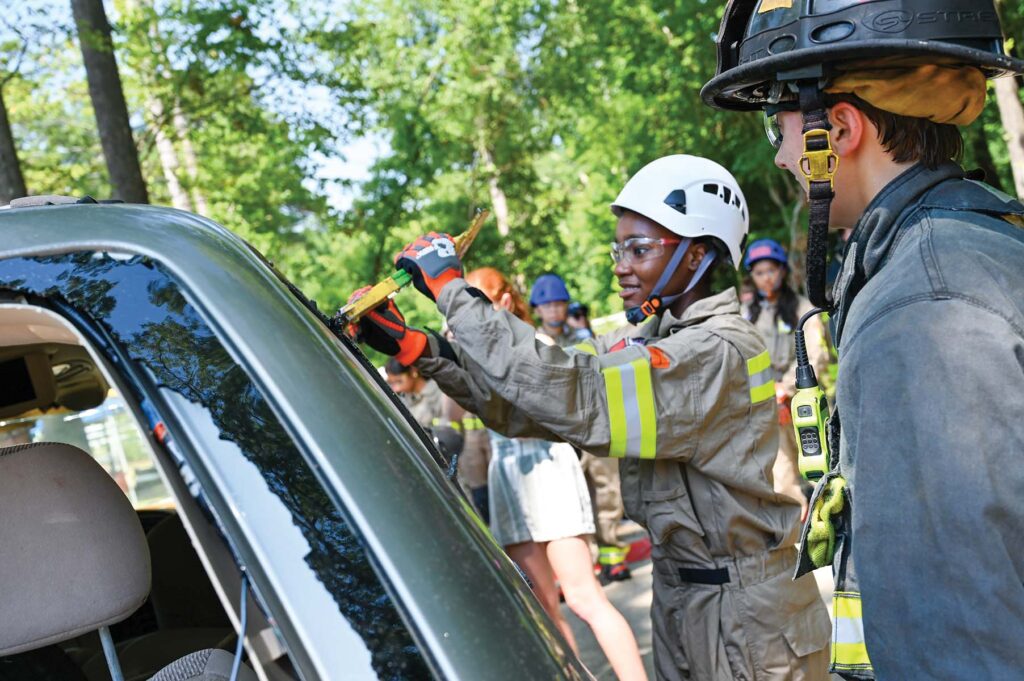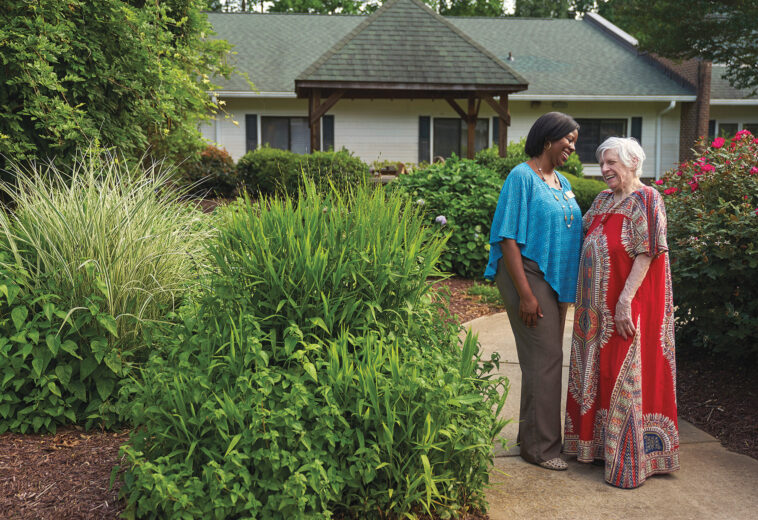Article:
BY JUDITH COOKIS RUBENS
Morrisville firefighter Natasha Byrd rides a ladder truck in her second career. She worked eight years in pharmaceutical manufacturing before, at age 28, changing direction to pursue the career she always wanted.
Byrd didn’t come from a family of police or firefighters. No one from her rural Johnston County background encouraged her early interest in firefighting. “I never thought this would be something I could do. Women where I grew up were not in the fire department,” she says.
It was an uphill climb, but Byrd graduated from a fire academy, obtained her EMT and fire certifications, and passed grueling physical tests to land a full-time firefighting job in Morrisville by age 30. Then came even more training hours. “I put in blood, sweat and tears,” she says.
Camp Ignite
This roundabout career route encouraged Byrd and two of her peers to launch Camp Ignite, a free firefighting summer camp for teen girls. Led exclusively by female firefighters from the Cary, Apex and Morrisville fire departments, the camp is the towns’ collaborative effort to introduce young women to fire service careers and to boost their confidence and leadership skills.
“I wanted to give them this eye-opening experience that this is something you could do,” Byrd says.
Summer 2024 marked the first Camp Ignite in the Triangle—it’s planned again for summer 2025. Last summer, the group—21 teen girls from ages 14 to 18— rotated between stations in all three towns. They learned basic first aid, CPR and ladder and hose basics, and performed physical agility exercises, vehicle extrications and even water rescues at Lake Crabtree.
One morning, the young women scaled a 60-degree ladder, about 70 feet in the air, simulating an aerial rescue. “Climbing the ladder truck was harder mentally. It was more scary than you would think,” says Katie Nelson, 18, of Apex, who participated. Currently a student at Wake Technical Community College, Nelson plans to earn her fire certifications and one day join a fire department. “It’s a lot more physically demanding to be a woman doing this. But I like that.”
Camp Ignite cofounder Courtney Butler, an Apex firefighter and community risk reduction coordinator, showed her group how to cut into a car to extricate and stabilize an accident victim. “They didn’t realize how many different hats firefighters wear,” says Butler. “We can put a Band-Aid on, or we can run into a burning building and pull you out.”
Even if all attendees don’t wind up applying to local departments, the camp is still a win, organizers say.
“I want girls to know they can do more than they can even imagine. There are no limits,” Byrd says.


Firefighting remains a heavily male-dominated profession. Nationally, only 5% of career firefighters are women, according to the National Fire Protection Association.
Local numbers hover around that figure, but it’s a number all three towns are trying to boost. “We’re trying to get females to recognize that the fire service is a place for them. It’s obviously a work in progress,” says Morrisville Fire Chief Nathan Lozinsky. “I have a saying that we don’t lower standards; we open doors.” Veteran women firefighters are encouraged to share their tips and tricks with female trainees, Lozinsky says. “I have to hold a charged hose line differently, so it doesn’t come back and smack me in the face,” Byrd explains. Apex’s Butler agrees. “I’m short — 5’3″ throwing a 20-foot ladder—I had to find another way to do it. It doesn’t always look as pretty, but I get it done as well as the next guy,” Butler says.
“We’ll build you up to our standard,” Lozinsky says.
“I don’t think anybody wants a service where they’re going to be viewed as being given things.” He adds, “The air pack on the fire truck is unisex. It weighs 30-some pounds. There’s not female gear or male gear, right? It’s just gear. The axe weighs the same.”
The CAM partnership
Camp Ignite isn’t the only collaborative effort between firefighters in Cary, Apex and Morrisville. Back in 2019, Cary, Apex and Morrisville fire departments (or CAM, for short) moved to a unified response fire system. The departments regularly train together, coordinate resources, and respond to calls within all three jurisdictions.
Cary’s Emergency Communications Center, or 911 Center, now handles all fire calls for Cary, Apex and Morrisville, dispatching trucks and emergency vehicles as needed. This unified system covers more than 100 square miles and serves nearly 250,000 residents. It follows the rule of “closest unit dispatch,” meaning the closest truck from either trio of towns responds. The first responding officer (or battalion chief, if needed) leads the response.
“We’re getting our people there to provide help the fastest, regardless of what the side of the truck says,” Lozinsky says. “What’s 25 seconds? Well, you hold your child who’s not breathing for an additional 25 seconds, and you want that truck [to get] there as quickly as it can.”
Historically, local fire departments use mutual aid agreements with neighboring towns in a crisis, but this arrangement takes it a step further. CAM firefighters train together year-round. Committees, made up of representatives from each department, decide standard operating procedures. The three fire chiefs meet monthly over lunch. CAM crews cover each other’s stations in the event of a large-scale emergency in one town.
Each department still maintains its own identity, equipment and uniforms. Budgets, hiring and personnel matters are handled separately as well.
It’s an unusual collaboration as fire departments, historically, can be territorial. But it makes a lot of sense in this part of western Wake County, where town boundaries snake around and through one another. “It’s not necessarily that we did it [built a unified response]. It’s that we’ve maintained it,” Lozinsky says.
A stronger, faster fire response helps residents and business owners in all three towns, Lozinsky adds. Better response metrics, more available equipment and increased water supply boosts a department’s ISO rating—the Insurance Services Office rating (1 to 10, with 1 being the best) that grades a community’s firefighting ability. Businesses in towns with high ISO ratings pay less for insurance, as do homeowners. Cary, Apex and Morrisville are ISO 1-rated.
Cary firefighter Jess Rogers found running Camp Ignite with her peers from Apex and Morrisville an extension of their everyday partnership. “We run so many calls together,” says Rogers, adding that CAM firefighters even practice operating each other’s trucks and equipment. “Everybody wins when you lose that ego and you’re willing to work together.”


